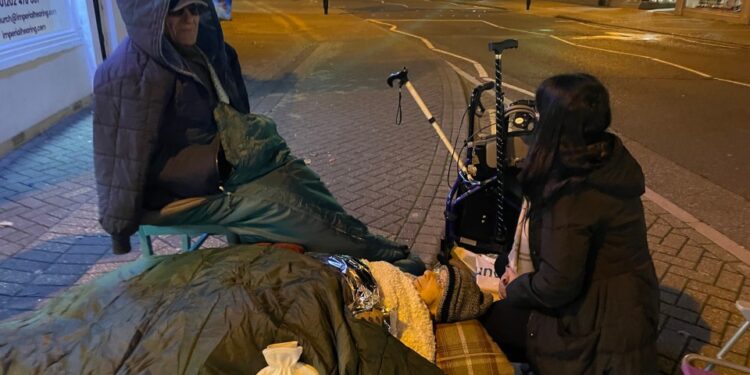A 95-YEAR-OLD woman was left lying on the pavement with a broken hip in freezing weather for five hours waiting for an ambulance.
Winifred Soanes fell over in Christchurch High Street, Dorset, in the early afternoon while out with her 92-year-old husband Andrew.
She was unable to move due to the sheer pain she was in.
Despite multiple concerned members of the public making repeated 999 calls for an ambulance and explaining Winifred was elderly and vulnerable, they were told she “was not a priority”.
People managed to prop her head up with shoe boxes from market stallholders and a pillow from a nearby pub.
Staff at Mountain Warehouse provided her with sleeping bags and charity shops gave blankets and hot water bottles to keep Winifred warm.
Others provided coffee and food to help Andrew, who is an army veteran and diabetic and who refused to leave his wife’s side.
An ambulance eventually arrived at 7.45pm on Monday and took Winifred to the hospital where she remains today.
To add insult to injury, Andrew has developed a chest infection as a result of being out in the cold for so long and cannot visit his wife in hospital.
People who helped the couple have slammed the “broken system”.
Jennifer Baylis, who was working in a charity shop, said: “I can’t tell you how upsetting it was, she actually said ‘I’m going to die here tonight’.
“She was in a phenomenal amount of pain and in such a vulnerable position, on a cold floor, totally reliant on complete strangers.
“She fell at 2.30pm and the ambulance finally showed up at 7.45pm.
“We were all distressed that there was no first responder available, no police officer, literally no one available to help for over five hours.
“You feel so helpless, I was so angry that they were in this position. It shouldn’t be happening in this day and age.
“The NHS are fantastic once help is there. We know how hard they work.
“But something went very very wrong to leave a 95-year-old lady on the pavement of a high street at night.”
David Lovell, who saw her fall and was the first to call for an ambulance, said: “I can’t describe how cold it was, and as it got dark, the temperature dropped really quickly.
“She was lying on the cold pavement and we couldn’t move her because she was in huge amounts of pain.”
When others called again to chase up the ambulance, they were given no time frame for how long the wait would be.
Winifred was eventually taken to Poole Hospital and is waiting for a specialist operation for her injuries.
Andrew said: “The situation was dire, but it’s great to know that when they need to, the community all pull together to help.”
A spokesperson for the South Western Ambulance Service, said: “We are sorry that we were not able to provide a timely response to this patient.
“Any occasion where the care we provide falls below the high standards our patients deserve and rightly expect is unacceptable.
“Handover delays at emergency departments remain one of our biggest challenges.
“To ensure our ambulances are available to attend the next emergency call within the community, we need to be able to hand patients over within the 15-minute national target.
“We continue to work hard with our partners in the NHS and social care, to do all we can to improve the service that patients receive.”
TIMELINE OF THE NHS WAITING LIST
THE NHS waiting list in England has become a political flashpoint as it has ballooned in recent years, more than doubling in a decade.
The statistics for England count the number of procedures, such as operations and non-surgical treatments, that are due to patients.
The procedures are known as elective treatment because they are planned and not emergencies. Many are routine ops such as for hip or knee replacements, cataracts or kidney stones, but the numbers also include some cancer treatments.
This is how the wait list has changed over time:
August 2007: 4.19million – The first entry in current records.
December 2009: 2.32million – The smallest waiting list on modern record.
April 2013: 2.75million – The Conservative and Liberal Democrat coalition restructures the NHS. Current chancellor Jeremy Hunt was Health Secretary.
April 2016: 3.79million – Junior doctors go on strike for the first time in 40 years. Theresa May is elected Prime Minister.
February 2020: 4.57million – The final month before the UK’s first Covid lockdown in March 2020.
July 2021: 5.61million – The end of all legal Covid restrictions in the UK.
January 2023: 7.21million – New Prime Minister Rishi Sunak pledges to reduce waiting lists within a year, effectively April 2024.
September 2023: 7.77million – The highest figure on record comes during a year hit with strikes by junior doctors, consultants, nurses and ambulance workers.
February 2024: 7.54million – Ministers admit the pledge to cut the backlog has failed.
August 2024: 7.64million – List continues to rise under Keir Starmer’s new Labour Government.








